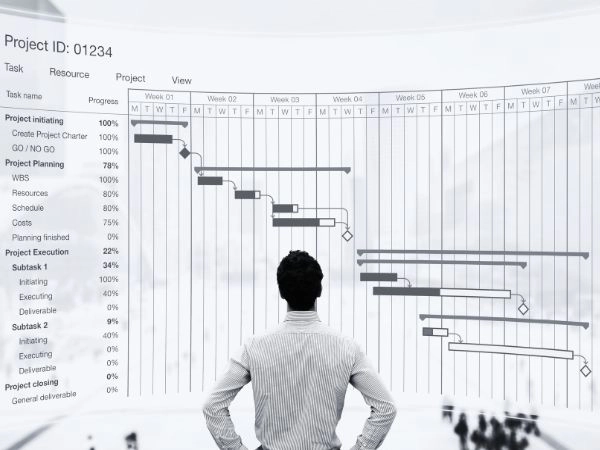Read In 12 Minutes
In construction project management, adeptly navigating and mitigating risks is crucial for contractors and business owners. From budget overruns to schedule delays, construction projects are inherently complex endeavors that demand proactive risk management strategies.
Utilizing innovative technologies can empower project managers to identify, assess, and mitigate risks with precision, ensuring smooth project delivery. In this blog, we’ll explore ten construction risks and offer insights into how leveraging technology can be instrumental in addressing them effectively.

1. Scope Creep:
Scope creep, a common challenge in construction project management, arises when project requirements expand beyond the initial scope, resulting in escalated costs and timelines. This phenomenon is often triggered by shifting client expectations, evolving project needs, or inadequate initial planning.
Construction technology plays a crucial role in managing scope creep and ensuring project success.

By leveraging robust project tracking and management software, project managers can establish clear project scopes, monitor changes in real-time, and facilitate effective communication with stakeholders. This proactive approach enables project teams to anticipate potential scope creep, address issues promptly, and maintain project objectives within manageable bounds.
Learn More About Project Controls Software
2. Budget Overruns:
Budget overruns plague construction projects, stemming from many factors such as inaccurate cost estimates, unforeseen expenses, and ineffective budget management practices. These overruns can significantly impact project profitability and overall success.
By utilizing advanced cost tracking and forecasting features through construction software, project managers can monitor expenditures in real-time, identify potential cost discrepancies, and take corrective measures promptly. This proactive approach enables construction projects to mitigate the risk of budget overruns, maintain financial stability, and ensure project success throughout the project lifecycle.

3. Schedule Delays:
Schedule delays pose significant challenges in construction projects, often arising from many factors such as adverse weather conditions, material shortages, or subcontractor issues. These delays can disrupt project timelines, leading to increased costs and client dissatisfaction.
With the aid of advanced scheduling tools, project managers can develop realistic timelines that account for potential delays and integrate buffers where necessary.

Additionally, this enables early identification of potential delays and facilitates prompt issue resolution, minimizing disruptions and keeping projects on track. By leveraging construction technology to prioritize schedule management, construction projects can mitigate the risk of delays and ensure timely completion.
4. Quality Control:
Ensuring high-quality standards is essential in construction projects to guarantee client satisfaction and minimize rework costs. Effective quality control measures are crucial for achieving this goal.
Construction technology empowers project managers to uphold high-quality standards effectively. Through the utilization of advanced quality management tools, project managers can establish clear quality benchmarks and monitor performance indicators in real-time. This enables them to address any issues promptly, ensuring adherence to standards throughout the project lifecycle.

Learn More About Earned Value Management
5. Resource Allocation:
Strategic resource allocation plays a pivotal role in mitigating risks, optimizing productivity, and minimizing project costs in construction endeavors. Project managers must carefully allocate resources, including workforce, equipment, and materials, to ensure they are used effectively throughout the project lifecycle. Monitoring utilization rates and identifying potential bottlenecks can help prevent resource shortages and delays.

Construction project management software plays a vital role in facilitating effective resource management practices. Through the utilization of integrated resource management features, construction teams can optimize productivity by efficiently allocating workforce, equipment, and materials.
6. Vendor Management:
Effectively managing relationships with vendors and subcontractors is crucial for ensuring project success, yet it comes with inherent risks.
Project management technology can play a pivotal role in mitigating these risks by providing tools to evaluate vendor performance, track deliveries, and address any issues promptly. By leveraging technology, project managers can enhance communication, streamline processes, and mitigate the risk of supplier-related delays or complications.

Manage Vendor & Subcontractor Relationships
7. Contractual Disputes:
Contractual disputes in construction projects often stem from disagreements regarding project specifications, scope changes, or payment matters. Construction technology can play a crucial role in mitigating such disputes by providing transparent communication and documentation processes.
Advanced project management software enables project managers to maintain clear records of project agreements, changes, and communications.

By leveraging this technology, construction teams can ensure transparency throughout the project lifecycle, reducing the likelihood of misunderstandings or disputes arising. Additionally, digital documentation facilitates quick access to relevant information, streamlining dispute resolution processes and minimizing project delays.
8. Technological Challenges:
Embracing modern technologies in construction can indeed pose significant challenges, including integration complexities, user adoption barriers, and cybersecurity vulnerabilities. However, construction technology offers solutions to overcome these hurdles and drive innovation within the industry.
Advanced construction software provides intuitive interfaces that streamline user experience and facilitate smoother adoption of modern technologies.

Moreover, robust security measures implemented within these platforms help mitigate cybersecurity risks, ensuring the safety of sensitive project data.
Additionally, construction technology providers often offer comprehensive support and training programs to assist companies in navigating the adoption process effectively. By leveraging these innovative solutions, construction companies can overcome technological challenges and harness the full potential of modern tools to enhance efficiency and productivity in their projects.
9. Financial Management:
Effective fiscal management is crucial for the success of construction projects, as budget overruns and cash flow issues pose significant risks. Utilizing construction technology can assist project managers in navigating these challenges.
By leveraging financial management software tailored for the construction industry, project managers can closely monitor costs, forecast expenses, and identify potential financial risks in real-time.

These tools enable proactive management and control, empowering project teams to make informed decisions to mitigate financial risks and ensure projects stay within budgetary constraints.
10. Stakeholder Communication:
Ensuring effective communication with stakeholders is crucial for the success of construction projects. Construction technology plays a key role in facilitating this communication.
By leveraging communication tools tailored for the construction industry, project managers can establish centralized communication channels, automate notifications, and provide real-time updates to stakeholders.

These technologies enable seamless communication and ensure that all parties involved, including clients, subcontractors, and regulatory agencies, are informed, and engaged throughout the project lifecycle.
Empowering Construction Success: Proactive Risk Management with 4castplus
In the fast-paced world of construction, contractors and business owners face many risks that can jeopardize project success. From unexpected budget overruns to delays in project schedules, navigating these challenges requires proactive risk management strategies.
Embracing innovative technology such as 4castplus can empower project managers to mitigate these risks effectively. By leveraging advanced tools and analytics, construction companies can enhance their ability to anticipate and address potential issues before they escalate. This proactive approach enables them to maintain control over project timelines, budgets, and quality standards, leading to successful project outcomes.
Learn More
Maintain tight visibility and control on the costs, activities and productivity of all your subcontractors and suppliers. Materials management, equipment rentals, miscellaneous purchases and subcontracted services can all coexist together with full control over budget, accruals, project inventory and much more. There is no other software system on the market that provides such comprehensive procurement management for construction projects.
 Platform
Platform Solutions
Solutions Owners
Owners Contractors
Contractors Engineering/EPCM
Engineering/EPCM Professional Services
Professional Services Resources
Resources White Papers
White Papers Case Studies
Case Studies Blog
Blog Videos
Videos Frequently Asked Questions
Frequently Asked Questions Company
Company About
About

